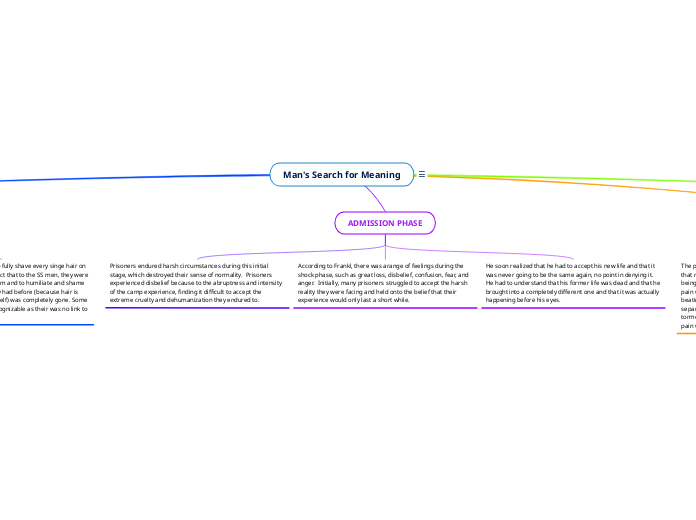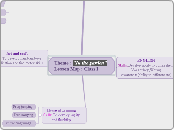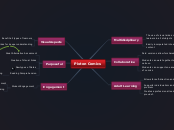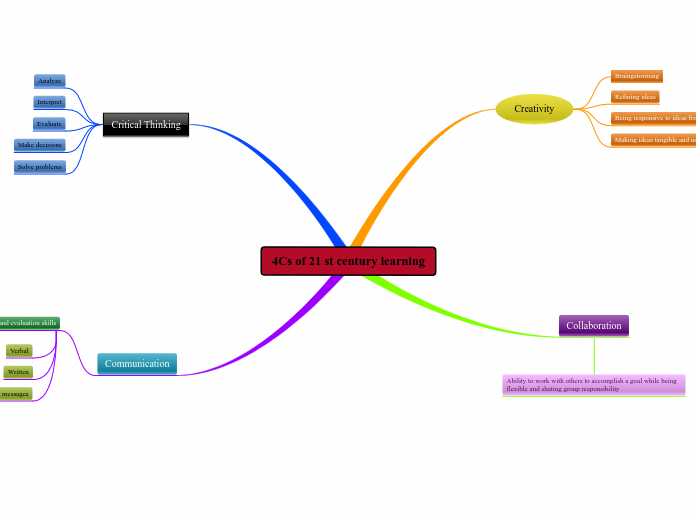Man's Search for Meaning
A mind map is a visual tool that is used to organize and represent information. It is often created around a central topic or idea, with related ideas branching out from it. Mind maps can be used for brainstorming, note-taking, problem-solving, and organizing thoughts and ideas. They are often created using diagrams or software that allows for easy manipulation and rearrangement of ideas. Mind maps can be a helpful tool for visual learners or individuals who prefer a more non-linear and creative approach to organizing information.
INNER WORLD
The prisoners developed mental havens by using their imaginations and creative abilities. They attempted to maintain a sense of their inner lives and intellectual abilities by engaging in thoughts or inner imagery, such as mentally creating music, recalling hobbies and loved ones, or having philosophical conversations.
In their minds, the prisoners sought peace from the unrelenting horrors of the camps. They learned mental coping skills to deal with the psychological and physical abuse they suffered, as they could not give into the mental turmoil any longer. The needed to gain self-control or they would be in a complete loss of themselves. To temporarily escape the harsh realities of the camp, some resorted to reminiscing happy, romantic, or self-accomplished events from their previous life. even though everything was taken from them, the prisoners were able to hold onto their internal enjoyment in which that could not be taken away from them
APATHY
They used apathy as a defense mechanism against the ongoing suffering, terror, and hopelessness that pervaded the camps. They tried to detach themselves from the constant pain all around them by becoming emotionally numb. They used this survival mindset as a self-preservation to protect themselves from more emotional torture. This decreased connection, hope, morals, attachment, worth, and care.
The psychological damages were so severe upon the prisoners that most of them were numb and stood almost lifeless after being beat. It seems slick they felt no physical pain and that the pain was coming from within. Though he still remembered the beatings in great detail, Frankl never forgot the mental separation from his physical body at that time. The physical torment was barely even recognized, more so the emotional pain was what was more damaging.
ADMISSION PHASE
He soon realized that he had to accept his new life and that it was never going to be the same again, no point in denying it. He had to understand that his former life was dead and that he brought into a completely different one and that it was actually happening before his eyes.
According to Frankl, there was arange of feelings during the shock phase, such as great loss, disbelief, confusion, fear, and anger. Initially, many prisoners struggled to accept the harsh reality they were facing and held onto the belief that their experience would only last a short while.
Prisoners endured harsh circumstances during this initial stage, which destroyed their sense of normality. Prisoners experienced disbelief because to the abruptness and intensity of the camp experience, finding it difficult to accept the extreme cruelty and dehumanization they endured to.
CONDITIONS
The prisoners were also had to fully shave every singe hair on their body which idolized the fact that to the SS men, they were all the same and nothing to them and to humiliate and shame them. Any personality that they had before (because hair is also an identification of one's self) was completely gone. Some looked at themselves as unrecognizable as their was no link to their former selves
The prisoners were also addressed as numbers so even their names were nonexistent, each had a number tattooed and sewn to them as a way to take away their humanity. The SS men had no desire for morally accurate identifications for the prisoners, they were seen as animals
There was very little to no medical treatment available in the camps, and those who was sick or hurt got almost nonexistent care. The weak and ill were frequently ignored and left to suffer
The prisoners were beaten with leather straps whenever they "misbehaved" or were not working well by the SS men, They faced constant humiliation and verbal abuse from the guards as well
They had to learn to divide their rations of bread and soup everyday in order to not starve throughout the day, the hunger became so big sometimes it was hard to resist to eat all their rations in one go to fill that hunger, but then later that day they knew they would regret it
They were forced to operate in unreasonably lengthy workdays and frequently performed strenuous work without sufficient sleep or food. For many prisoners, this harsh abuse resulted in bodily harm, weariness, and an abrupt decline in health.









